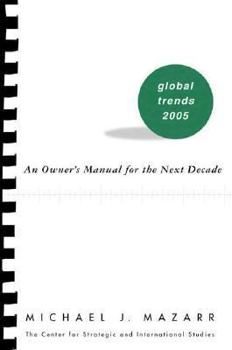Global Trends 2005: An Owner's Manual for the Next Decade
Select Format
Select Condition 
Book Overview
Mazarr (Director of the New Millennium Project at the Center for Strategic and International Studies, Washington DC) discusses how rapid advances in science and technology are transfiguring society,... This description may be from another edition of this product.
Format:Hardcover
Language:English
ISBN:0312218990
ISBN13:9780312218997
Release Date:June 1999
Publisher:Palgrave MacMillan
Length:330 Pages
Weight:1.12 lbs.
Dimensions:1.1" x 6.0" x 8.5"
Customer Reviews
3 ratings
Much food for thought
Published by Thriftbooks.com User , 18 years ago
Peter Drucker wrote that every few hundred years there occurs a sharp transformation and within a few short decades society rearranges itself - its worldview, its basic values, its social and political structure, its arts, its key institutions; fifty years later, there is a new world. We are living through such a transformation today in which our major advances all but wreck societies. Organized around knowledge, we see the first hints of the information age that is undermining authority and creating a uniform world - a world full of surprises because it is uncertain whether humanity will use its power effectively and wisely. Reshaping our world are four global issues, nine themes and six trends; Mazarr provides policy recommendations for each trend - a total of 32 recommendations. The global issues are demography, natural resources, the environment, and human culture. The themes are: the paradoxical and contradictory nature of this period of transition; the blurring of boundaries between disciplines, industries and social enterprises; the new social morphology of our societies is networks; there is a shift from manufactured products to knowledge as the basic good of economic life; things that have worked well may no longer succeed and we must prepare for the inevitable down slope that accompanies progress; the new moral system embraces compassion, social equity, charity, concern for the natural environment, personal responsibility, religion and spiritual life; perception is as important as the facts; major social transformations are immensely disruptive; individuals and civic associations are empowered, leveling the playing field. Trend 1 is that we are separating into two worlds: rich, industrialized countries have clean, knowledge-based business, an aging population, declining birthrates, a shrinking work force, skyrocketing pension and health care costs while developing countries face problems of deforestation, soil erosion, untreated sewage, misuse of pesticides, dirty industry and an enormous number of young people needing child welfare, education and work. Supplies of energy, food and other resources should be sufficient for the decade to 2010 but the world's cushion is declining, with markets more susceptible to price shifts. A decisive determinant of individual and collective success is culture -values, attitudes, habits, religion, language - and visionary leadership as they shape thoughts, beliefs, commitments and decisions; some cultures, such as Taiwan and Korea, are better equipped for success in the knowledge era. Trend 2: The Engines of History are the forces producing global change and where they are taking us. Trend 3: A Human Resources Economy shows that people whose culture values education, thrift and hard work will thrive; societies will succeed or fail in this new age to a great extent based on the emphasis they place on educating their people. Trend 4: An Era of Global Tribes tells us that the world is becoming more cosm
Globalization and Paradoxical Tribalization
Published by Thriftbooks.com User , 19 years ago
Mazarr provides a detailed description and analysis of the current state of the world, presenting six trends for coming decades. Of particular interest is his description of the interplay of Globalization and Tribalization/Regionalization, which has implications for ethnic identities.
Putting It Together
Published by Thriftbooks.com User , 24 years ago
What I found wonderfully invigorating about Global Trends 2005 is that it draws upon so many vastly different strands of contemporary knowledge and understanding and weaves them together in a manner that is at once challenging, provocative, and accessible. Make no mistake, this is a rigorous exercise in holistic thinking. But it's also a fun--if sobering--read. That's because the author writes in a personal, plain-spoken manner that conveys an exceptionally bright yet level-headed way of making sense of our world as it lurches into the 21st century. Michael J. Mazarr points out more seriously complex problems on the horizon than most of us would care to think about. Yet he never acts the part of the shrill alarmist that is so typical of books of this nature. Nor, when he shifts his focus to globalization's potential for worldwide benefit (e.g., attacking Third World poverty), does he play the chirpy cheerleader that is all too often the alternative persona of futurologists. This book is an exemplary instance of well-balanced multidisciplinary thinking about our now deeply entrenched information society and the simultaneously good and bad prospects that it presents to the interdependent corners of the globe.





